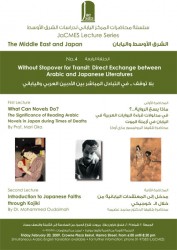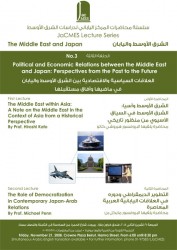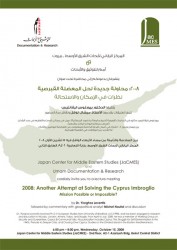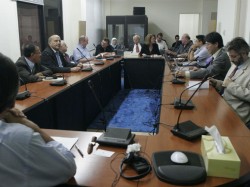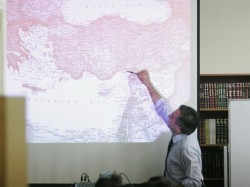Sorry, this entry is only available in 日本語.
JaCMES Lecture Series The Middle East and Japan No.4
“Without Stopover for Transit:Direct Exchange between Arabic and Japanese Literatures”
| Date / Time | Friday, February 20, 2009. 18:00-20:30 |
|---|---|
| Venue | Crowne Plaza, Hamra Street |
| Language | Arabic and English (simultaneous interpretation available) |
| For further Information | 01-975851 (JaCMES) |
| 18:00-18:05 | Welcome Address: Prof. Hidemitsu Kuroki (Director, JaCMES) |
|---|---|
| 18:05-18:45 | Lecture 1: Prof. Mari Oka “What Can Novels Do? The Significance of Reading Arabic Novels in Japan during Times of Deaths” |
| 18:45-19:05 | Discussion |
| 19:05-19:20 | Coffee Break |
| 19:20-20:00 | Lecture 2: Dr. Mohammed Oudaimah “Introduction to Japanese Faiths through Kojiki” |
| 20:00-20:20 | Discussion |
- Lecture 1
- “What Can Novels Do? The Significance of Reading Arabic Novels in Japan during Times of Deaths”
By Mari Oka - Prof. Mari Oka, one of leading Japanese scholars in the field of modern Arabic literature, teaches at Kyoto University. Her publication includes Arab: Literature as Prayers (2008), In the Shadow of Palm Trees: The Third World Feminism and the Strength of the Literature (2006), both in Japanese, and translation of Ghassan Kanafani’s works such as Returning to Haifa.
- Summary:
“What can literature do when hundreds of thousand children are starving to death in Africa?” is the famous question raised by Jean-Paul Sartre in 1960′s. He said that “Nausea” is powerless in front of those starving children. The same old question has been lingering in me since the second Intifada broke out. What can we do through novels when the Palestinians are being killed every day just as if their lives have no significance as human beings? Is there any meaning in reading Arabic novels in Japan when the very people in the Arab world are being killed? What is the meaning of being a translator of Arabic literature when death and violence rule these people’s lives? To go further, why do we write and read novels in the first place? For what purpose and for whom? I have been struggling with those questions for these past eight years while reading Arabic novels and have finally found the answer. Now, I can say reading novels is equivalent to living others’ lives as our own experiences. Through reading novels, strange lands and unfamiliar people soon become part of our own intimate world. Reading novels changes our relationship with the world, which might be a small but significant step to changing the world itself. By introducing the trend of modern Arabic literature studies in Japan since 1970s, I will explore the possibility of establishing communality which Arab and Japanese readers may share by reading Arabic novels during times of death. - Lecture 2
- “Introduction to Japanese Faiths through Kojiki”
By Mohammed Oudaimah - Dr. Mohammed Oudaimah, Arab poet and translater living in Japan, teaches Arabic and Arabic Literature at several universities including The University of Tokyo. His voluminous publications include What Occuurred in Cinema (1993, poets), The Kojiki: The Record of Ancient Events (1999, translation), and A Handful of Sand: Selected Poets of Takuboku Ishikawa (2007, translation) (all in Arabic).
- Summary:
This lecture aims to approach Japanese beliefs based on what is written in the book Kojiki (The Record of Ancient Events), which contains the creation history of Japan (or the Universe) and the resultant events. This story is similar to that of Lucifer and Adam with God in monotheist religions. In this story different deities order two gods, a male and a female, to get married in order to give birth to the Japanese islands (while the deities watch). The wife passed away because of the numerous births and went to the underworld where the spirits reside. However, after a while, her husband missed her and followed her, asking her to come back to give birth to the other children. But she couldn’t. According to the story, the husband returned and purified himself in the river water to get rid of the traces of the underworld. His acts led to the birth of three gods: The goddess Amaterasu (the sun) was born when he washed his left eye, then the god of the Moon was born when he washed his right eye, and the god Susanoo(Hayasusano) was born when he washed his nose. Afterwards, he gave them their role in the governing the world: Heaven went to Amaterasu, night to the moon, and the sea to Susanoo. Each began to work except Susanoo who continued to cry because he missed his mother. His father became angry and banished him. But before departing, he wanted to say goodbye to his sister at her home. Amaterasu had doubts about her brother’s intention so he proposed a test that would reveal his intentions and considered himself the winner. He wanted to make this victory last forever, so he spread corruption throughout his sister’s home. Amaterasu got scared and retired to a grotto in heaven and thus the Universe went dark. Millions of gods got her out of her shelter (signaling the return of light) and decided to punish Susanoo and exile him to Izumo, which is earth.
Would it be possible to draw a comparison between Susanoo’s character in this story and Lucifer who refused to fulfill God’s order and was banished by him, or with Adam who did wrong when he forgot God’s orders? This lecture tries to answer this question partially.
International Workshop ”Ethnicity and State in Iran and Transcaucasia”
| Date / Time | 24 January 2009 (Sat.) 14:00-18:00 |
|---|---|
| Venue | Large Meeting Room (303), ILCAA |
| Language | English |
| Admission:Free, No registration is required. |
- Prof. Touraj Atabaki (Leiden University)
- “From Multilingual Empire to Contested Modern State: Ethnic Diversity and Territorial Integrity of Iran. Domestic Harmony and Regional Challenges.”
- Dr. Takayuki Yoshimura (esearch Fellow, ILCAA)
- “Introducing the Homeland: the Relationship between Soviet Armenia and the Armenian Communities Abroad”
- Discussant : Prof. Takashi Kuroda (Tohoku University)
JaCMES Lecture Series The Middle East and Japan No.3
“Political and Economic Relations between the Middle East and Japan: Perspectives from the Past to the Future”
| Date / Time | Friday, November 21, 2008. 18:00- 20:15 |
|---|---|
| Venue | Crowne Plaza, Hamra Street |
| Language | Arabic and English (simultaneous interpretation available) |
| For further Information | 01-975851 (JaCMES) |
| 18:00-18:10 | Welcome Address: Prof. Hidemitsu Kuroki (Director, JaCMES) |
|---|---|
| 18:10-18:50 | Lecture 1: Prof. Hiroshi Kato “The Middle East within Asia: A Note on the Middle East in the Context of Asia from a Historical Perspective” |
| 18:50-19:05 | Discussion |
| 19:05-19:20 | Coffee Break |
| 19:20-20:00 | Lecture 2: Prof. Michael Penn “The Role of Democratization in Contemporary Japan-Arab Relations” |
| 20:00-20:15 | Discussion |
- Lecture 1
- “The Middle East within Asia: A Note on the Middle East in the Context of Asia from a Historical Perspective”
By Hiroshi Kato - Prof. Hiroshi Kato a prominent Japanese scholar of the modern Egyptian history, teaches economic history of the Middle East at Hitotsubashi University, Tokyo. His publication includes “A Historical Study of the Market Society-Reflected in the Waqf System in Muslim Societies,” Annals of Japan Association for Middle East Studies (2004); “Migration, Regional Diversity, and Residential Development on the Edge of Greater Cairo,“GIS-Based Studies in the Humanities and Social Sciences (2005); and “Rashda: A Village in Dakhla Oasis,” Mediterranean World (2008).
- Summary :
This lecture will deal with the politico-economic relationship between the Middle East and Asia (especially East Asia) in the 21st century, by reviewing its history and by introducing several Japanese academics’ opinions on this subject. The main points of discussion will be
(1) The Middle East: a region that disappeared from the narrative of modern economic history,
(2) The Middle East in the context of modern Asian economic history, and
(3) The Middle East within Asia in the 21st century.
The lecturer agrees to an opinion of a Japanese economic historian, Professor Kaoru Sugihara, to the effect that one of the most important questions that East Asia will face in this century is how to maintain “the oil triangle” in the global economy. “The oil triangle” means the world-scale settlement pattern of international trade between East Asia, the Middle East and the West (US and EU) since the 1970s. “The oil triangle” could be the foundation of the world economic order in the 21st century, although its theory should be partially modified by the challenges from the countries such as Russia, India, and Brazil that have been developed in recent years. - Lecture 2
- “The Role of Democratization in Contemporary Japan-Arab Relations”
By Michael Penn - Prof. Michael Penn teaches at the University of Kitakyushu, Fukuoka, Japan, and is Executive Director of Shingetsu Institute for the Study of Japanese-Islamic Relations, an open research institute that examines Japan’s connections with the Islamic world from a variety of perspectives. He has published more than twenty articles including “Islam in Japan: Adversity and Diversity” in Harvard Asia Quarterly (2006) and “East Meets East: An Ottoman Mission in Meiji Japan” in Princeton Papers (2007). He is currently preparing his first full length book for publication on the topic of Japan and the War on Terrorism.
- Summary :
This lecture will review the role of “democratization” in Japanese foreign policy under the Koizumi, Abe, and Fukuda administrations (2001-2008). First, the political character of the three prime ministers’ policies will be contrasted. During the period of Shinzo Abe’s premiership, the notion of democratization began to play a significant role under the “Arc of Freedom and Prosperity” initiative led by Foreign Minister Taro Aso. However, the current Japanese leader, Yasuo Fukuda, is not a believer in integrating the goal of democratization into Japanese foreign policy; instead, he prefers to put emphasis on political stability and the cultivation of good relations with regimes of all character. While the US-Japan alliance has remained the fundamental basis of Japanese policy toward the Arab nations in recent years, there have been notable shifts in the diplomatic language that has accompanied Japanese foreign policy statements. This has had a certain degree of impact on Japanese policy toward Iraq, Lebanon, and Palestine, in particular. On the other hand, Japanese relations with Egypt and the six nations of the Gulf Cooperation Council do not seem to have been affected in any way by these subtle shifts in diplomatic emphasis.
Lecture meeting 2008:Another Attempt at Solving the Cyprus Imbroglio. Mission Possible or Impossible?
“Muslims and Islamic Studies in Japan ”
| Date / Time | Wednesday, October 15, 2008. 18:00-20:00 |
|---|---|
| Venue | Japan Center for Middle Eastern Studies(JaCMES), 2nd Floor, A2-1, Azariyeh Bldg, Beirut Central District |
| Language | English |
| For further Information | 01-975851 (JaCMES) 01-553604 (Umam Documentation & Research) |
| The meeting is open to the public |
The lecture outlined the historical background to the Cyprus question as an issue of implementation of the principle of self-determination enshrined in the Atlantic Charter (1941) as well as in the UN Charter (1945). The Cypriot demand for self-determination was in the 1940s equivalent to enosis, the union of the island with Greece ? especially as this was implicitly promised to the Cypriots by Winston Churchill. As the Nazi Germans occupied Greece in 1941, the wartime British PM urged on the islanders to voluntarily join the British forces in order to “fight for freedom, fight for Greece”. The Greek Cypriots responded joining the war efforts in their thousands; only to be betrayed as the defeat of Nazism did not bring the promised enosis but a continuation of the colonial rule. Moreover in 1954, the British started building up two powerful military bases on the southern coast of the island, which were reinforced after the Suez debacle a couple of years later.
Their withdrawal from the UN mandate for Palestine (1948) coupled with the evacuation of their forces from Suez forced the British to transfer their Middle East Military Headquarters to Cyprus. The strategic importance of the island as a staging post for operations in the region grew exponentially. The building of the RAF Akrotiri airbase turned the island into an unsinkable aircraft carrier, firmly anchored in the Eastern Mediterranean. Greece, ravaged by ten years of war (1940-49), was too weak to be entrusted such an important base. Hence the 1960 Treaties between the UK, Turkey and Greece produced a Republic of Cyprus which bore more affinity to a protectorate than to a sovereign state.
The lecturer drew attention to the large presence (40,000-43,000) of Turkish troops with the state of the art weaponry occupying the northern third of the island since 1974. He explained that despite the positive climate created by the current Greek and Turkish Cypriot leaders the two sides remain apart as regards the perception of the nature of the searched for new settlement. Whereas the Greek Cypriot side perceives it as a transformation of the RoC from a unitary to a federal state without guarantor powers, the Turkish Cypriot side insists that the basis of the talks is that two states, the RoC and the self-styled TRNC are negotiating to form a new state. Moreover the TC side is unwilling to accept European as opposed to Turkish guarantees and military presence.
Last but not least, Dr Leventis placed emphasis on the role of the island regarding crisis management, humanitarian aid and peace-keeping operations to Lebanon. Since 1 May 2004, the island republic has been the EU’s outpost in the Middle East. The RoC is the southeastern-most EU member state ? lying only 240 kms away from Beirut. Tellingly, in the crisis of summer 2006, tens of thousands of Lebanese citizens were evacuated via Cyprus. The Lefkosia government has placed the airport of Larnaca, the naval port of Lemesos, as well as the Andreas Papandreou airbase in Pafos at the disposal of the ongoing UNIFIL operation. In this connection, Turkey’s high-profile role in providing substantial manpower and military hardware for UNIFIL was also noted. Turkey sought unsuccessfully to assume the naval command of the UNIFIL operation in the sea between Cyprus and Lebanon. Turkey’s bid for UNIFIL’s command raised eyebrows in the RoC in view of the continuing Turkish occupation of the northern part of its territory.
Thus a settlement of the Cyprus question which would include a phased withdrawal of the huge Turkish occupation force would enhance stability in the region.
Furthermore, in his concluding remarks, Prof. Leventis pointed out the glaring need for a comprehensive security system that will serve the best interests of all the peoples in the Eastern Mediterranean basin.
Workshop on Cultural- and Environmental Co-existence in Sabah and its Neighboring Areas
| Date / Time | 9 October 2008 15:00-20:00 |
|---|---|
| Venue | Room 304 ILCAA |
| 15:00-15:10 | Opening Remarks by Ikuya Tokoro (ILCAA, TUFS) |
|---|---|
| 15:10-15:50 | Presentation by Mary Sintoh (Institute for Development Studies: IDS Sabah) “Practices of the Indigenous Communities in Sabah towards Conservation of the Environment” |
| 15:50-16:30 | Presentation by Noko Kuze (Graduate School of Science, Kyoto University) “The Possibility of the Co-existence of Orangutan and Human in Sabah: Ecology and Conservation of Orangutan” |
| 16:30-16:40 | Tea Break |
| 16:40-17:20 | Presentation by Katsumi Okuno (J.F.Oberlin University) “Fear of the Thunder God’s Anger: Men and Animals among the Penan of Sarawak” |
| 17:20-18:00 | Discussion Time |
* The presentation will be given in English.
An exchange lecture organized by TUFS Liason Office in Kota Kinabalu
| Date / Time | 27 August 2008 14:00-16:30 |
|---|---|
| Venue | School of Social Sciences, University Malaysia Sabah |
- Akiko NISHIKIDA(ILCAA, TUFS)
- “Palestinians in Diaspora: Problems around their Naturalization in Jordan and Lebanon”

